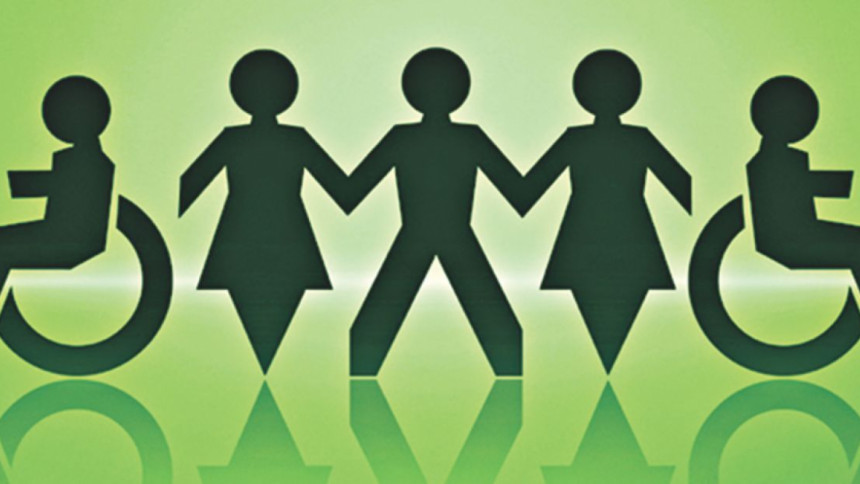ENSURING RIGHTS OF the women with disability

The rights of women with disabilities (WWD) are one of most ignored issues in Bangladesh. Women with disabilities are deprived of rights and privileges because of the existing social attitude towards them. Approximately 15 million people suffer from various disabilities, but still it is regrettable that such huge population is suffering each and every day due to improper care and treatment. In Bangladesh a large number of disabled populations including women with disability have limited access to education and employment. In the families, they do not participate in the decision making process even in social gatherings.
There are some co-relating elements we find while studying disability issue. Lack of health care during childhood of a girl child is one the main reasons for permanent disability. The 2010 report of the UNICEF indicates that the main causes of disability are low access to health and disability services. When appropriate health services are absent, persons' impairments lead to permanent disability.
Further, discrimination is often compounded for women on the grounds of gender, age and minority status. Gender related violence is a cause and consequence of disability. Gender related practices such as son preference, abandonment of the girl child, discriminatory feeding practices, child marriage, dowry are all gender related acts of violence that lead to mental, physical and psycho social disability.
Moreover, Rape or sexual harassments are probably the most common forms of violence against disabled women in Bangladesh. To add, physical assault by family members or violence by intimate partner is often not considered as a crime rather a day-to-day incident. Among the women interviewed in a survey, about 84% reported ever having experienced at least one act of emotional abuse, physical, or sexual violence from their partner during their lifetime.
In 2001, the Disability Welfare Act was passed. Later in 2007, Bangladesh ratified the UN convention on the rights of persons with disability (UNCPRD). Considering it, state parties are under obligation to incorporate affirmative actions in their disability policies so that through some positive interventions equal participation and opportunity can be ensured. So in 2013 Protection of the Rights of the Persons with Disabilities Act has been passed and enforced.
But there are some major lacunas found in connection of ensuring rights of disabled women:
Under the Act, certain committee's i.e. national co-ordination committees, city committees have been formed which are responsible to ensure disability rights but it is major mistake that no position for representative (from disabled women) is found.
Moreover, assessments of risk situation and humanitarian emergencies have been absent in the Act which is surely a major gap. All necessary measures to ensure the protection and safety of women with disabilities in situations of risk, including situation of armed conflicts, humanitarian emergencies and the occurrence of natural disasters are not addressed by the Act.
The Act does not protect WWD from all forms of exploitation, violence and abuse, including their gender-based aspect which is another imperative under the Convention. Provisions protecting the rights of women with disabilities must be included in the Dowry Prohibition Act 1980, the Domestic Violence (Prevention and Protection) Act 2010, the Family Court Ordinance 1984, draft Victim Witness Protections Laws and other pending law reform initiatives. Moreover in cases of violence, exploitation and torture on disabled women, legal provisions related to summons of persons, trial in absentia, adjournment and appeals (Sections in Chapter VI, Section 339 B, Section 344 and Sections contained in the Code of Criminal Procedure should be strictly complied with).
There are certain government policies regulated by the ministry of women and children along with ministry of social welfare. In the Act, it was expected that some directory provisions will be there that can be used as guidelines while making relevant public laws.
It is noteworthy that those shortcomings are affecting the enforcement of disability rights of WWD because it is not only the aim of a law to recognise substantive rights but to provide full process of effective execution and implementation. Moreover, considering the three basic doctrines of disability rights (empowerment, participation and legal protection) it is found that the Act has admitted those but in a limited capacity which needs further reform.
The writer is Lecturer in Law at the School of Social science, Humanities and Language (SSHL), Bangladesh Open University.


 For all latest news, follow The Daily Star's Google News channel.
For all latest news, follow The Daily Star's Google News channel. 



Comments